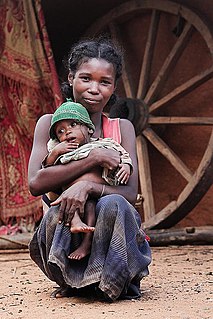Incest is human sexual activity between family members or close relatives. This typically includes sexual activity between people in consanguinity, and sometimes those related by affinity, adoption, clan, or lineage.
Divorce also known as dissolution of marriage, is the process of terminating a marriage or marital union. Divorce usually entails the canceling or reorganizing of the legal duties and responsibilities of marriage, thus dissolving the bonds of matrimony between a married couple under the rule of law of the particular country or state. Divorce laws vary considerably around the world, but in most countries, divorce requires the sanction of a court or other authority in a legal process, which may involve issues of distribution of property, child custody, alimony, child visitation / access, parenting time, child support, and division of debt. In most countries, monogamy is required by law, so divorce allows each former partner to marry another person.

A father is the male parent of a child. Besides the paternal bonds of a father to his children, the father may have a parental, legal, and social relationship with the child that carries with it certain rights and obligations. An adoptive father is a male who has become the child's parent through the legal process of adoption. A biological father is the male genetic contributor to the creation of the infant, through sexual intercourse or sperm donation. A biological father may have legal obligations to a child not raised by him, such as an obligation of monetary support. A putative father is a man whose biological relationship to a child is alleged but has not been established. A stepfather is a male who is the husband of a child's mother and they may form a family unit, but who generally does not have the legal rights and responsibilities of a parent in relation to the child.

A parent is a caregiver of the offspring in their own species. In humans, a parent is the caretaker of a child. A biological parent is a person whose gamete resulted in a child, a male through the sperm, and a female through the ovum. Biological parents are first-degree relatives and have 50% genetic meet. A female can also become a parent through surrogacy. Some parents may be adoptive parents, who nurture and raise an offspring, but are not biologically related to the child. Orphans without adoptive parents can be raised by their grandparents or other family members.
Child custody, conservatorship and guardianship are legal terms that are sometimes used to describe the legal and practical relationship between a parent and the parent's child, such as the right of the parent to make decisions for the child, and the parent's duty to care for the child.
Paternity law refers to body of law underlying legal relationship between a father and his biological or adopted children and deals with the rights and obligations of both the father and the child to each other as well as to others. A child's paternity may be relevant in relation to issues of legitimacy, inheritance and rights to a putative father's title or surname, as well as the biological father's rights to child custody in the case of separation or divorce and obligations for child support.
A step family, blended family, bonus family, or instafamily is a family where at least one parent has children that are not biologically or adoptive related to the other spouse or partner. Either parent, or both, may have children from previous relationships. Children in a stepfamily may live with one biological or adoptive parent, or they may live with each biological or adoptive parent for a period of time. In addition, visitation rights mean that children in stepfamilies often have contact with both biological parents, even if they permanently live with only one.
The fathers' rights movement is a movement whose members are primarily interested in issues related to family law, including child custody and child support, that affect fathers and their children. Many of its members are fathers who desire to share the parenting of their children equally with their children's mothers—either after divorce or as unwed fathers—and the children of the terminated marriage. The movement includes men as well as women, often the second wives of divorced fathers or other family members of men who have had some engagement with family law.
Parental alienation describes a process through which a child becomes estranged from a parent as the result of the psychological manipulation of another parent. The child's estrangement may manifest itself as fear, disrespect or hostility toward the distant parent, and may extend to additional relatives or parties. The child's estrangement is disproportionate to any acts or conduct attributable to the alienated parent. Parental alienation can occur in any family unit, but is believed to occur most often within the context of family separation, particularly when legal proceedings are involved, although the participation of professionals such as lawyers, judges and psychologists may also contribute to conflict.
Parental alienation syndrome (PAS) is a term introduced by child psychiatrist Richard Gardner in 1985 to describe what he believed to be a distinctive suite of behaviors in children that includes showing extreme but unwarranted fear, disrespect or hostility towards a parent. Gardner believed that a set of behaviors that he observed in some families involved in child custody litigation could be used to diagnose psychological manipulation or undue influence of a child by a parent, typically by the other parent who may be attempting to prevent an ongoing relationship between a child and other family members after family separation or divorce. Use of the term "syndrome" has not been accepted by either the medical or legal communities and Gardner's research has been broadly criticized by legal and mental health scholars for lacking scientific validity and reliability. While remaining controversial, the derivative term parental alienation is sometimes used to describe a similar family dynamic.
Joint custody is a court order whereby custody of a child is awarded to both parties. In the United States, there are two forms of joint custody, joint physical custody and joint legal custody. In joint physical custody, the lodging and care of the child is shared according to a court-ordered parenting schedule with equal or close to equal parenting time. In joint legal custody, both parents share the ability to make decisions about the child, regarding e.g. education, medical care and religion, and both can access their children's educational and health records.
Child custody is a legal term regarding guardianship which is used to describe the legal and practical relationship between a parent or guardian and a child in that person's care. Child custody consists of legal custody, which is the right to make decisions about the child, and physical custody, which is the right and duty to house, provide and care for the child. Married parents normally have joint legal and physical custody of their children. Decisions about child custody typically arise in proceedings involving divorce, annulment, separation, adoption or parental death. In most jurisdictions child custody is determined in accordance with the best interests of the child standard.
In family law, contact, visitation and access are synonym terms that denotes the time that a child spends with the noncustodial parent, according to an agreed or court specified parenting schedule. The visitation term is not used in a shared parenting arrangement where the mother and father have joint physical custody.
Kinship care is a term used in the United States and Great Britain for the raising of children by grandparents, other extended family members, and adults with whom they have a close family-like relationship such as godparents and close family friends because biological parents are unable to do so for whatever reason. Legal custody of a child may or may not be involved, and the child may be related by blood, marriage, or adoption. This arrangement is also known as "kincare" or "relative care." Kinship placement may reduce the number of home placements children experience; allow children to maintain connections to communities, schools, and family members; and increase the likelihood of eventual reunification with birth parents. It is less costly to taxpayers than formal foster care and keeps many children out of the foster care system. "Grandfamily" is a recently coined term in the United States that refers to families engaged in kinship care.

The Indian Child Welfare Act of 1978 (ICWA) is a Federal law that governs jurisdiction over the removal of Native American (Indian) children from their families in custody, foster care and adoption cases.

In human society, family is a group of people related either by consanguinity or affinity. The purpose of families is to maintain the well-being of its members and of society. Ideally, families would offer predictability, structure, and safety as members mature and participate in the community. In most societies, it is within families that children acquire socialization for life outside the family, and acts as the primary source of attachment, nurturing, and socialization for humans. Additionally, as the basic unit for meeting the basic needs of its members, it provides a sense of boundaries for performing tasks in a safe environment, ideally builds a person into a functional adult, transmits culture, and ensures continuity of humankind with precedents of knowledge.
Parental child abduction is the hiding, taking, or keeping hold of a child by his/her parent while defying the rights of the child's other parent or another member of the family.
On March 31, 2016, a Federal District Court struck down Mississippi's ban on same-sex couples from adoption. Previously several other states had similar bans however Mississippi's was the last to be overruled. On June 26, 2017, the Supreme Court reversed an Arkansas Supreme Court ruling and ordered all states to treat same-sex couples equally to opposite-sex couples in the issuance of birth certificates. These court rulings have made adoption by same-sex couples legal in all 50 states.
Adoptive Couple v. Baby Girl, 570 U.S. 637 (2013), was a decision of the Supreme Court of the United States that held that several sections of the Indian Child Welfare Act (ICWA) do not apply to Native American biological fathers who are not custodians of a Native American child. The court held that the procedures required by the ICWA to end parental rights do not apply when the child has never lived with the father. Additionally, the requirement to make extra efforts to preserve the Native American family also does not apply, nor is the preferred placement of the child in another Native American family required when no other party has formally sought to adopt the child.

Adoption in the Philippines is a process of granting social, emotional and legal family and kinship membership to an individual from the Philippines, usually a child. It involves a transfer of parental rights and obligations and provides family membership. The Department of Social Welfare and Development (DSWD) defines adoption as a "socio-legal process of giving a permanent family to a child whose parents have voluntarily or involuntarily given up their parental rights."




